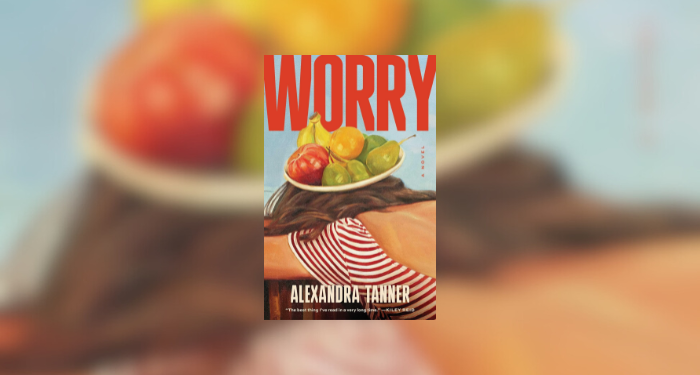
Sisters Become Roommates and the Absurdity Runs High in WORRY by Alexandra Tanner

Jules Gold’s life is already falling apart in March 2019 when her younger sister Poppy comes to crash in the apartment Jules once shared with the man she thought she would be with forever. Together, the young women doom-scroll, adopt a dog named Amy Klobuchar (who may or may not have rabies), deal with their mother’s increasing belief in conspiracy theories, and search for meaning while trying—without much success—to stave off existential dread.
Worry is a darkly hilarious debut novel from an exciting new voice. It’s available now wherever books are sold.
Night falls and we decide to FaceTime our mother. Neither of us has heard from her in almost a week. Apparently, when Poppy left Florida, our mother warned her that our living together would be disastrous and she didn’t want to hear about anything, good or bad, that happened during our cohabitation. Poppy told me about this the other week after I finally showed her the ominous text I got about us bringing out the worst in each other.
Do you think we do? I asked Poppy.
She thought for a minute. In some sense, she said, but she never clarified which sense she meant.
Now Poppy and I squeeze close together on the couch so we can fit on camera. I try to hold Poppy’s phone at an angle that will please both of us, and we bicker over whose face looks fattest. We’re always self-conscious about our chins.
“Oh, my chin,” our mother says as soon as the call picks up and she sees her own face. She clutches at her jaw. Poppy and I look at each other and laugh. “What’s so funny?” our mother asks.
“Nothing,” Poppy says. “We were just saying we’re so insecure about our chins.”
“You should be,” our mother says. “One day you’ll get my chin. Every woman in my family gets this chin.”
“Your chin’s fine,” Poppy says.
“You’re beautiful,” I say. “Your chin is beautiful.”
The call ends. Our mother, it seems, has hung up. I ring back.
“If you’re going to make fun of me about my chin,” she says upon answering, “I’m not doing this.”
Poppy and I look at each other and laugh again. “No one’s making fun of you about your chin,” Poppy says. “You’re the one who said something about your chin, and then we said something about our chins in solidarity.”
“Poppy, I was looking on Instagram just now, and I was very distressed by your post.”
“What post?” Poppy says, just as I’m thinking, What post? and reaching for my phone to open up her Instagram and see what rare missive she’s sent out into the world. Poppy hates social media.
“You know what post,” says our mother.
There on Poppy’s stories is a blurry picture of some yellow graffiti spray-painted across the bridge over the Atlantic train yard: COPS KILL 🙂
“Why do you even have Instagram?” Poppy asks. “And why don’t you follow us?”
“I follow your sister,” she says. “I made it for a secret project. It’s none of your business why I have Instagram or why I do anything I do. Stop changing the subject, thinking I’ll forget. You can’t play me. That sign in your post should have said COPS HELP PEOPLE.”
“Graffiti, not a sign,” Poppy says.
“Story, not post,” I say.
Our mother ignores us. “Do you remember when we called the police because the neighbor’s horses were running in the street? And the police came and put the horses back where they belonged? And then came to our door and introduced themselves and asked if we needed anything else? Cops help.”
Poppy laughs. “No one likes cops, Mommy.”
“I like cops. I like them very much.”
“No one in New York likes cops,” I say.
“You’re being very combative, Jules,” says my mother.
“Me?”
“Yes, you.”
“It’s out of my control, this is like the ninth day of my period.”
“I don’t know how you girls have become like this. Picking on everything I say. Spreading lies about the police. Talking to me about your periods. I didn’t raise you this way. Do you have any idea how devastating it is for me? To hear you talk like this? About the people who protect us?” My mother’s voice sounds so profoundly hurt that I briefly wonder if I’m on the wrong side of the whole cops thing after all.
“Let’s drop it,” I say.
“How about I drop you,” our mother says. “Poppy, have you found a job? Or are you going to live off
your sister for the rest of her life?”
Poppy and I look at each other, raising our eyebrows.
“Don’t look at each other like that,” our mother says.
“Like what?” we ask at the same time.
“Clearly,” our mother says, “you’re having your own conversation. Call me when you get whatever’s going on out of your system.”
The call drops—she’s hung up again. We try her one more time, but she rejects it on the second ring. We text our mother that we love her. She gives the text a thumbs-down.
“I don’t understand why the three of us can’t ever just have, like, a nice conversation,” I say. “Not even a conversation, just a moment even. What’s her deal with us? Why doesn’t she like us?”
“Oh,” Poppy says without looking up, “it’s because she’s a narcissist and we’re her appendages. It says so in the trauma book. Have you noticed how whenever we say ‘I love you’ she never says it back?”
“Yes,” I say, “but I thought I was crazy.”
“Also, I’m not trying to live off you,” Poppy says. “I have another job interview tomorrow. I promise you I’m not trying to take advantage of you, but I’m sorry if it seems like I am.”
I’m trapped. If I tell Poppy I think our mother’s being cruel, it’s like I’m excusing her failure to find footing, like I’m telling her it’s okay to be a fuckup; if I say something like: Well, you better hope you get it, because I’m kicking you out next week, I’m feeding something bad inside me: The part of me that agrees with my mother. The part of me that wants to be alone for no good reason.
“I pity her,” Poppy says, frowning in a way that makes her seem strong. “I really do.”
“Pity her for what?”
“Um,” Poppy says. She thinks for a minute. “I don’t know. I guess I don’t. I just thought it would make me sound like I had power or something.”“It did,” I say, patting her. Just stay, I want to say, just stay here and get some real furniture and pay me a couple hundred bucks a month and let everything work itself out. I think about a post I saw earlier in the week from a girl I went to high school with who’s become, according to her bio, a spiritual teacher, psychic healer, and doula of the true self: a soft sage-colored square, floaty black text inside—text with a powerful-adjacent message, text I wish was 15 percent less psychotic so I could share it with Poppy, to strengthen her, to make her laugh, to make her feel strong for real: You are a whole-ass person. When you are aligned with your own energy, everything else will arrive.
Excerpted from WORRY by Alexandra Tanner. Copyright © 2024 by Alexandra Tanner. Reprinted by permission of Scribner, and imprint of Simon & Schuster, Inc.










